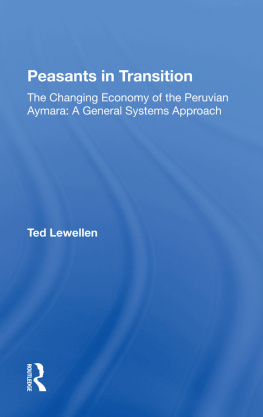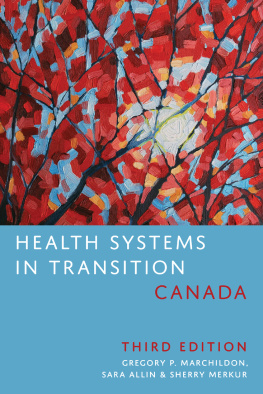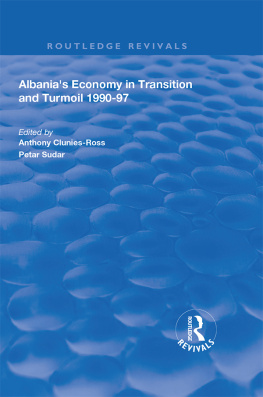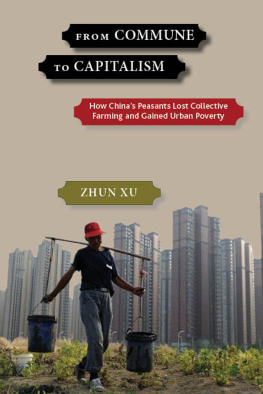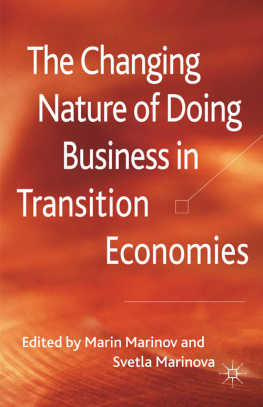Peasants in Transition
The Changing Economy of the Peruvian Aymara: A General Systems Approach
Westview Replica Editions
This book is a Westview Replica Edition. The concept of Replica Editions is a response to the crisis in academic and informational publishing. Library budgets for books have been severely curtailed; economic pressures on the university presses and the few private publishing companies primarily interested in scholarly manuscripts have severely limited the capacity of the industry to properly serve the academic and research communities. Many manuscripts dealing with important subjects, often representing the highest level of scholarship, are today not economically viable publishing projects. Or, if they are accepted for publication, they are often subject to lead times ranging from one to three years. Scholars are understandably frustrated when they realize that their first-class research cannot be published within a reasonable time frame, if at all.
Westview Replica Editions seem to us one feasible and practical solution to the crisis. The concept is simple. We accept a manuscript in camera-ready form and move it immediately into the production process. The responsibility for textual and copy editing lies with the author or sponsoring organization. If necessary we will advise the author on proper preparation of footnotes and bibliography. The manuscript is acceptable as typed for a thesis or dissertation or prepared in any other clearly organized and readable way, though we prefer it typed according to our specifications. The end result is a book produced by lithography and bound in hard covers. Edition sizes range from 200 to 600 copies. We will include among Westview Replica Editions only works of outstanding scholarly quality or of great informational value and we will exercise our usual editorial standards and quality control.
Peasants in Transition: The Changing Economy of the Peruvian Aymara: A General Systems Approach
Ted Lewellen
The peasant transition from a subsistence-agriculture economy to a money economy is one of the most significant and widespread phenomena of the twentieth century. For the worlds largest occupational groupcomprising from one-half to two-thirds of the worlds populationthis process constitutes a fundamental transformation in terms of economic and social complexity.
The Aymara Indians of the Lake Titicaca Basin in Peru are presently undergoing such a transformation. Drawing upon thirteen months fieldwork and on the most detailed economic data ever gathered for this area, Professor Lewellen shows why and how the Aymara have entered the money economy and the effects of this rapid change on social structure, religion, kinship, and world view. Several principles that might apply to a general model of peasant transition are suggested on the basis of comparison of the Aymara with peasant groups in other parts of the world.
The book is an important demonstration of the viability of General Systems Theory for anthropology. Among the surprising findings directly deriving from this approach is that the Aymara transition is a response not to inputs from the industrial sector, but to instabilities within the traditional Aymara economic system itself. The Systems Theory principle of the adaptive value of deviance is the basis for an in-depth analysis of the emergence of the Seventh-Day Adventists as a power-elite in many Aymara communities.
Ted Lewellen, assistant visiting professor of anthropology at Texas Tech University, received his Ph.D. in anthropology from the University of Colorado, Boulder.

First published 1978 by Westview Press
Published 2019 by Routledge
52 Vanderbilt Avenue, New York, NY 10017
2 Park Square, Milton Park, Abingdon, Oxon OX14 4RN
Routledge is an imprint of the Taylor & Francis Group, an informa business
Copyright 1978 Taylor & Francis
All rights reserved. No part of this book may be reprinted or reproduced or utilised in any form or by any electronic, mechanical, or other means, now known or hereafter invented, including photocopying and recording, or in any information storage or retrieval system, without permission in writing from the publishers.
Notice:
Product or corporate names may be trademarks or registered trademarks, and are used only for identification and explanation without intent to infringe
Library of Congress Number: 78-343
ISBN 13: 978-0-367-28256-1 (hbk)
This research was partially funded by the Instituto de Estudios Aymaras, under the direction of Father Frank McGourn, a Maryknoll missionary. The Institute arranged and paid for my language training in Cochabamba, helped with field expenses, and aided with introductions. Staff writer Victor Ochoa and his wife, Brindice, were especially helpful, as were the many bulletins they have writ ten on Aymara culture. The Institute library in Chucuito, which I used extensively, is probably one of the best anywhere on the Aymara.
I got to know virtually all the Catholic missionaries then working in the Peruvian altiplano. They housed me, fed me, entertained me, allowed me to accompany them on their rounds in the campo , and proved a valuable source of information on many aspects of Aymara society. Above all, these dedicated men and women provided the friendship that made some long and frustrating months bearable.
My greatest thanks must be reserved for the campesinos of the altiplano who allowed this absurd gringo to live in their homes and communities for months on end, to observe their meetings and church services, and to ask them all sorts of ridiculous questions. These people--one of the most maligned in all anthropological literature (e.g., Trotter 1973, LaBarre 1966: 133)--exhibited their share of kindness and humor to soften the inevitable frustrations of field work. More, they showed me that behind the veneer of alien customs and beliefs, there is a basic humanity that I would be hard pressed to define, but which will remain the enduring discovery of my research.
The peasant transition from a subsistence agriculture economy to a money economy is one of the most widespread phenomena of the twentieth century. For the worlds largest single occupational group, comprising the vast majority of the peoples of the developing countries, this process constitutes a fundamental evolution in terms of economic and social complexity.
Such an evolution touches every aspect of society. People who a short time ago were economically self-sufficient have become a major source of wage labor for industrializing nations. Everywhere, once docile--or alternately dormant and violently erupting--peasants are making their voices heard in national political processes. Countrysides, where only the baying of a mule or the ripple of wind on rows of barley could be heard after dark, now resound with the latest song hits or play-by-play soccer games from radios purchased in big city markets. Men who dared not dream beyond a new horse or a good stud bull now pray for a motorcycle or even a truck. Farmers aid their ancient rituals to the Earth Mother with chemical fertilizers, and native curanderos routinely prescribe penicillin along with their herbs and rites. Extended families dissolve and new cohesions and loyalties form along non-kin lines. Indigenous religions either lose their authority or assume a host of new functions.


